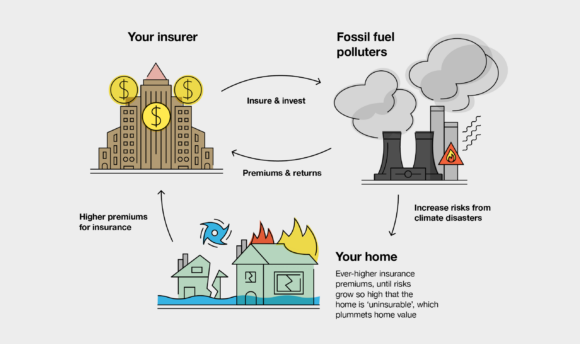As one of the world’s biggest fossil fuel insurers, insurance giants like Travelers can play a pivotal role in reaching global climate goals. As Travelers prepares for its annual general meeting, it faces a critical moment—yet again—to align its practices with the climate and human rights expectations of today’s workforce and Travelers’ community.
Climate-Conscious Students are the Future of Travelers Employees
Today’s students are tomorrow’s workforce and they are more concerned about climate change than any generation before them. Over 300 students from Connecticut universities signed a petition demanding Travelers and The Hartford end their support of fossil fuels. In the petition, students commit not to work for these companies until they divest from and commit to stop underwriting new fossil fuel projects.
Across the pond, students in the UK are also boycotting the massive insurance market, Lloyd’s of London, which insures a significant portion of oil & gas.
The next generation is not just looking for jobs; they’re seeking careers that don’t perpetuate harm, whether that is through enabling fossil fuel expansion or violating the United Nations declaration on Free, Prior, and Informed Consent (FPIC). The UN Secretary-General António Guterres told graduates in May 2022,
“So my message to you is simple: don’t work for climate-wreckers. Use your talents to drive us towards a renewable future.”
For Travelers, a company that self-proclaims it has, “Earned a reputation as an insurance company that cares,” the reputational risk of continuing to insure and invest in fossil fuel expansion is even higher.
The message from students is clear. In the petition, the signatories write, “It is our view that insurers, as society’s risk managers, should fulfill their potential to accelerate the transition to a decarbonized economy that will reduce greenhouse gas emissions rather than continuing to fuel the climate crisis by underwriting fossil fuels.”
Current Employees are Ready to Act, Too
It’s not just the incoming talent that’s pushing for change. According to a recent report, a staggering 80% of employees are ready to take action on climate change at their companies. The report says the findings, “Show that employees believe businesses have a moral responsibility to act on climate change.”
The Board & Investor Responsibility
The responsibility now lies with the board members of Travelers. As stewards of corporate governance, board members have the power—and the duty—to guide the company towards practices that align with both ecological and economic objectives without further harming communities.
The AGM is an opportune moment for the board and investors to show employees and future talent that they are serious about climate and human rights. One resolution being voted on asks Travelers to publish a report describing how human rights risks and impacts are evaluated and incorporated into the underwriting process, with a particular focus on FPIC. The resolution states that the Gwich’in people native to Alaska and Canada have engaged Travelers since 2020, asking that Travelers commit to not insuring oil and gas activities in the Arctic National Wildlife Refuge.
Other global insurers, such as Chubb, AXIS Capital, and Swiss Re have begun integrating FPIC into risk frameworks and policies. Compared to such peers, Travelers has done nothing to integrate climate and social risk into its business operations.
All Eyes are on Travelers
The eyes of the public, especially the conscientious students and dedicated employees, are on Travelers. The actions it takes—or fails to take—will influence its reputation and operational success and signal to the industry at large the role corporations can play in battling climate change. For Travelers, the time to act is now.



